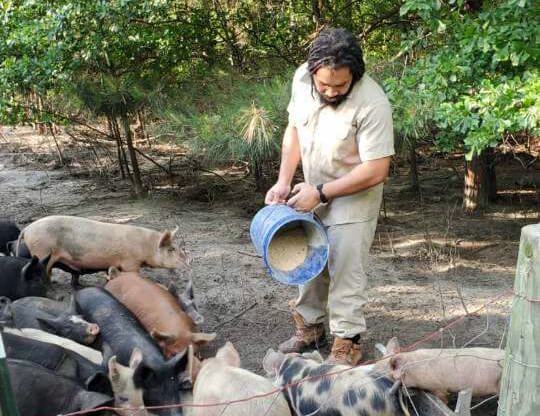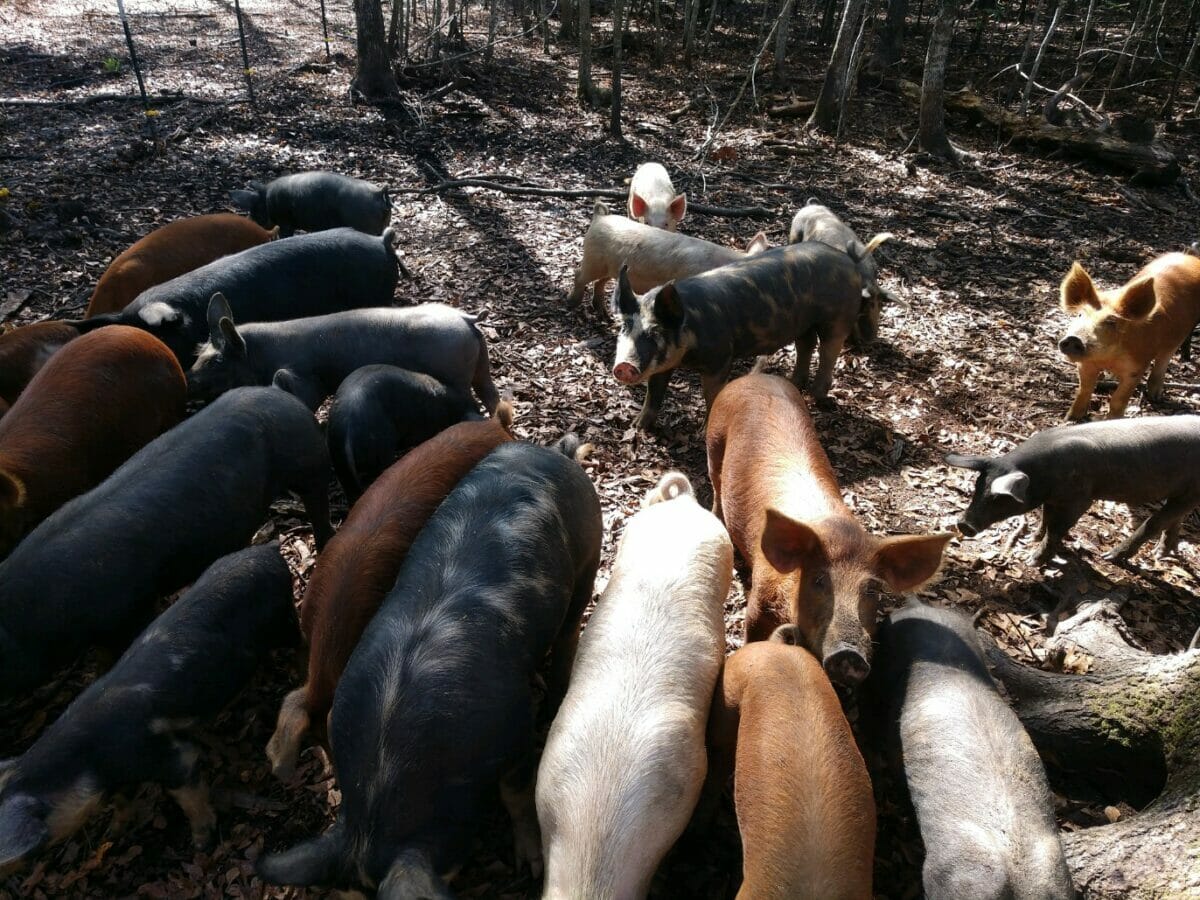This Black farmer hopes to reclaim some of his family’s agricultural history.

At the age of seven, Marvin Ross was given his first pig. His grandfather, a farmer, helped him feed and care for it, and along the way, he taught Ross valuable lessons he would someday need to run a farm of his own. “I raised that pig and we took it to the market,” he says. “That’s where it all started for me.”
In addition to working a full-time job, Ross’ grandfather, Thomas Henry Ross, farmed more than 100 acres of land in Dorchester, South Carolina. With 11 children to help, Thomas and his wife grew row crops such as corn, soybeans and cotton, in addition to vegetables such as cucumbers, tomatoes and bell peppers.
Ross remembers visiting his grandparents’ farm after school and on weekends, where he gravitated to the livestock—cows, goats, chicken, guinea hens and a horse named Sadie. But it was the hogs to which Ross was most drawn, enamored by their squeals, large ears and flat snouts. “Out of all the animals, the pigs were my favorite,” says Ross, who remembers how the drove of pigs would move in the most peculiar of ways, congregating like members of a church.
When he left for college, Ross considered studying forestry, but decided on business management instead. A couple of years into his studies, his grandfather died. Ross returned to the old land, which had gone untended for years, after graduating.
In 2009, Ross founded Peculiar Pig Farm, named for the way he remembers watching his grandfather’s hogs shuffle around. He started taking pigs to the market, following the path his grandfather had shown him, and has gradually grown his practices from there.
As a southern Black farmer, farming the same land that his grandfather once did is a way for Martin Ross to honor and continue his heritage. But it doesn’t come without challenges.
According to the most recent data from the USDA, out of the 3.4 million farmers in the US today, only 45,000 are Black. White farmers account for 98 percent of the acres. And, according to the Environmental Working Group, Black farmers have been systemically denied access to land, subsidies and loans.
Ross hopes the land grants proposed through the Justice for Black Farmers Act can help him reclaim some of his family’s agricultural heritage. He has applied for the last three years for grants through the Natural Resources Conservation Service that would fund a water pump, planting grass and fencing. But he says he hasn’t received a penny through that process. Up until this point, he has funded the majority of the farm’s operations himself, without any loans. As a result, he has had to grow his farm at a much slower pace than he’d like.
Ross was recently awarded a Farmers of Color Network Infrastructure Fund grant, and he plans to use it—the first monetary assistance the farm has ever received—to add mobile refrigeration to his business.
Today, he farms 12 acres of land, a fraction of what his grandfather once had. Ross raises Yorkshire, Hampshire and Red Duroc hogs, which he rotates through the woodlots and pastures before spreading seeds, as well as chickens and ducks. Later this year, he plans to add geese to the pack, and then he hopes to introduce row crops, working his way up to running an operation similar to the one his grandfather had. “My goal is to do everything that he was doing,” says Ross. “If you integrate everything together, you have a sustainable model. It cuts down on your fertilizer, it cuts down on everything you have to add to your crops, because the animals are doing a majority of the work.”
The model Ross is following might be called regenerative agriculture by some, but for him, it’s simply farming. After all, that’s the way his grandfather—and generations of Black and Indigenous farmers—had always operated. “They didn’t have the money and the resources [to do it differently],” says Ross. “This term [regenerative agriculture] has recently come about, but my grandfather had been doing this in the ’50s. A lot of things are being brought to the forefront now that people weren’t getting credit for at the time.”
Ross wants to one day farm at least 60 acres. Although it’s not as much land as his family once tended, it’ll be just one step closer to reclaiming and honoring his grandfather’s legacy. “I’m definitely following his ways,” he says.

May God bless this up and coming farmer. You rock.
Best of luck to this farmer.
Can we just be referred to as Farmers.
Thanks
So awesome! I know it’s the best bbq and food my family ever had!!
Love this! Didn’t even know I live not 10 miles from his farm. I am going to make it a point to get to know him and support his efforts.
Need to benchmark
May God bless your all of your endeavors and increase your territory Mr. Ross. Your an inspiration being one of the closest Black farmers to where I grew up (in Kansas City, MO). My plans for life are similar to yours so it’s a joy to read your story. Maybe we could meet in person one day. Stay blessed brother!
I was forwarded the article about you in the New York times last week. The picture in the paper of you looks so much like my son! Twins, truly! He is part Native American, so his beard is not as full, but my entire family is in shock! We have pig pickings every now and then (a family tradition) and seeing you over the cinder block pit, which is what we used until we built a permanent one, is incredible. The tradition is something from my parents who were born and raised in the big city of Kingstree, SC! My… Read more »
Awsome’
I live in Chicago. Do you ship here or have venders in Chicago?